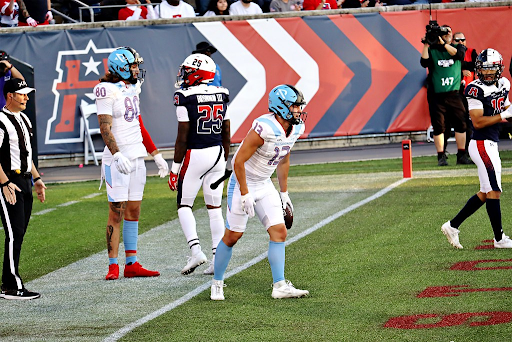
In the realm of sports betting, having an advantage is absolutely crucial. As data analytics and predictive modelling become more prevalent, bettors are leaning heavily on data-driven methods to up their game. Here, we’ll take a deep dive into crafting a successful betting model tailored for XFL (Xtreme Football League) matchups. We’ll cover everything from crunching numbers using statistical analysis to employing predictive modelling tools, uncovering the ins and outs of crafting a reliable predictive model for betting on XFL games.
Introduction to data-driven approaches for predicting XFL game outcomes
The XFL, a pro football league, offers a special chance for sports bettors to make the most of its constantly changing landscape. Like any sports league, what happens in XFL games depends on a bunch of things, like how well players perform, what strategies teams use, and even external stuff like the weather.
Data-driven approaches leverage historical data and advanced statistical techniques to identify patterns and trends that can inform betting decisions. By analyzing past performance metrics and identifying key variables, bettors at $1 deposit casino for Canadian players can gain valuable insights into team dynamics and player capabilities, thereby enhancing their ability to predict game outcomes.
Overview of statistical analysis techniques and predictive modelling tools
At the heart of crafting a winning betting model for XFL games is good ol’ statistical analysis. We’re talking about using tools like regression analysis, machine learning algorithms, and even Monte Carlo simulations to dig into the data and pull out useful insights that help us make predictions.
For sports bettors, regression analysis is like peeling back the layers of an onion. It helps us understand how various factors, like team stats and player performance, relate to the game’s ultimate outcome. By diving into historical data, regression models give us a sneak peek into how different variables influence the game’s results. This insight arms us with the knowledge needed to make smarter, more informed predictions when placing our bets.
Machine learning algorithms are like the Sherlock Holmes of the sports betting world. They can sift through vast amounts of data, like decision trees, random forests, and neural networks, to uncover hidden patterns and connections. What’s truly remarkable is their ability to handle even the most complex datasets and adjust on the fly to changing circumstances. This adaptability makes them indispensable tools for crafting betting models that pack a punch in accuracy.
Imagine you’re sitting at a blackjack table, but instead of dealing cards, you’re exploring endless possibilities. That’s what Monte Carlo simulations do for sports bettors. They run through thousands of potential outcomes, considering all sorts of variables and their probabilities. This gives us a bird’s-eye view of the various game scenarios, helping us gauge the risks involved and make smarter decisions when it comes to betting.
Strategies for collecting and analyzing relevant data for building an XFL betting model
The key to crafting a winning betting model boils down to one thing: data. But not just any data—it’s got to be top-notch, relevant stuff. When you’re putting together a betting model tailored for XFL games, you need to cast a wide net and gather all sorts of data points that paint a complete picture of team and player performance. Here are some of the must-have data sources for building your XFL betting model:
- Historical game data: This includes past game results, scores, and statistics, such as yards gained, turnovers, and time of possession.
- Player performance metrics: Individual player statistics such as touchdowns, tackles, interceptions, and completion rates provide valuable insights into player capabilities and contributions to team performance.
- Team statistics: Aggregate team metrics such as offensive and defensive rankings, scoring averages, and red zone efficiency can help assess team strengths and weaknesses.
- Coaching strategies: Analyzing coaching decisions, play-calling tendencies, and game plans can offer insights into team strategies and potential game dynamics.
- Player injury reports: Keeping track of player injuries, their severity, and the expected recovery time can help assess the impact on team performance and adjust predictions accordingly.
- Player matchups: Evaluating individual player matchups, such as wide receiver vs. cornerback or offensive line vs. defensive line, can provide insights into potential mismatches and their influence on game outcomes.
- Game location: Factoring in the game’s location, whether it’s a home game or an away game, can impact team performance due to factors like crowd support, travel fatigue, and familiarity with the playing environment.
- Momentum and form: Assessing team momentum and recent form, such as winning streaks or losing streaks, can help gauge team confidence and momentum heading into the game.
- Betting market data: Monitoring betting market data, including line movements, public betting trends, and betting volume, can offer valuable insights into market sentiment and potential betting opportunities.
- Social media sentiment: Analyzing social media sentiment around teams, players, and upcoming games can provide additional context and insights into fan expectations, team morale, and potential game narratives.
After you’ve gathered all the necessary data, it’s time to roll up your sleeves and dive into some serious analysis. Think of it like detective work—you’re searching for clues and connections that can help you predict game outcomes more accurately. This means digging deep into the data with techniques like exploratory data analysis, where you’re basically poking around to see what stands out. You’ll also want to run some hypothesis tests to confirm your suspicions and validate your assumptions. And don’t forget about model validation—you want to make sure your betting model is as reliable as it can be, so you’ll need to put it through its paces to see how well it performs in the real world.
Challenges and limitations of betting models and how to account for uncertainty in predictions
Even though relying on data-driven strategies can give us a leg up in sports betting, it’s not all smooth sailing. Like anything worthwhile, there are hurdles to overcome. Here are a few of the main challenges we face:
- Sample size: The relatively small sample size of XFL games compared to more established leagues can limit the effectiveness of predictive models and increase the risk of overfitting.
- Data quality: Incomplete or inaccurate data can compromise the integrity of betting models and lead to erroneous predictions.
- Dynamic nature of sports: Sports are inherently unpredictable, and unexpected events such as injuries, coaching changes, and player performance fluctuations can introduce uncertainty into predictions.
To address these challenges, bettors can employ several strategies to account for uncertainty in their predictions:
- Risk management: Implementing robust risk management strategies, such as setting betting limits and diversifying portfolios, can help mitigate the impact of unpredictable outcomes.
- Continuous monitoring: Regularly updating and recalibrating betting models based on new data and emerging trends can improve their predictive accuracy and adaptability to changing dynamics.
- Ensemble modelling: Combining multiple predictive models through ensemble techniques, such as model averaging or stacking, can enhance predictive performance and reduce the risk of individual model biases.
- Human judgment: While data-driven approaches are valuable, incorporating human judgment and domain expertise can provide valuable insights and context that may not be captured by quantitative analysis alone.
To sum it all up, creating a successful betting model for XFL matches demands a blend of statistical prowess, predictive modelling finesse, and a solid understanding of the game. It’s about using the right tools, like crunching numbers and running simulations, but also having that gut feeling honed by experience. By tapping into the right data, using powerful analytical methods, and embracing the uncertainties that come with it, bettors can definitely up their game and gain that crucial edge in XFL sports betting.
Unleash the Action: Sign up for XFL Insider and Fuel Your Passion for Football!

XFL Kickoff
XFL News Alerts
USFL and XFL Merger: A Deep Dive into the Historic Collaboration
Latest Podcast
-


XFL Podcast
/ 12 months agoXFL-USFL Merger Insights: Houston’s Future, Draft News, Player Movement – Ep. 216
Welcome to Episode 216 of the “XFL Week In Review,” your premier destination for...
By Mark Perry




